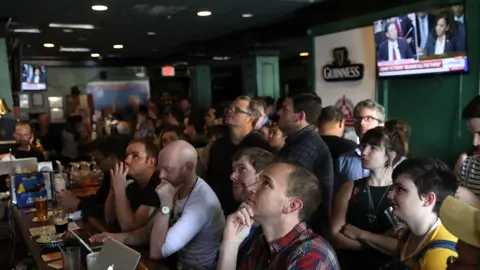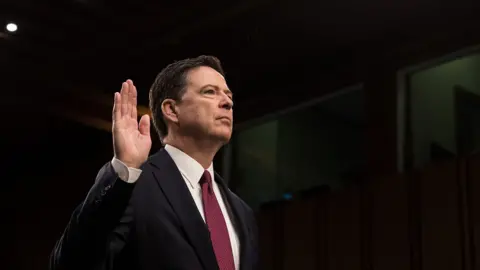Ways Comey could hurt Trump - or himself
Get ready for Comey week, the sequel. The former FBI director's book - A Higher Loyalty: Truth, Lies and Leadership - will be released to the public on Tuesday, and he has his first of a series of major television interviews airing Sunday night.
Ten months ago Mr Comey held much of the US in rapt attention as he testified before Congress after being fired by Donald Trump weeks before. The former director was questioned about the ongoing investigation into possible ties between the Trump campaign and Russia and the circumstances of the director's dismissal, and accused the president of lying and defamation.
Can the 2018 book release and media blitz possibly live up to last year's event? Much depends on any new revelations, some of which have already emerged as US media pore over advance copies of the book.
The president has already tweeted that Mr Comey is a liar, a leaker and an "untruthful slime ball" - and he may just be getting warmed up.
Republican countermeasures include a website, lyincomey.com, online advertising, television surrogates and a quick-reaction team.
The real bombshells may emerge when the former director is pressed by interviewers. Here's a look at some of the topics they may cover.
The Kelly call
One new episode detailed in the book is a phone call the director received minutes after he was fired from John Kelly, then secretary of homeland security and currently White House chief of staff.
Mr Kelly, according to the Daily Beast, was "sick" over Mr Comey's dismissal and said he would resign in protest because he didn't want to work for "dishonourable people" - that is, Mr Trump. Mr Comey writes that he convinced the former general to stay on the job to serve as a moral guide for the president.
The chief of staff's relations with Mr Trump have been strained as of late, and Mr Comey's account of the phone conversation could cause further friction.
Back in January, Mr Trump dramatically turned on his top political adviser, Steve Bannon, after comments he made to Michael Wolff in the book Fire and Fury that were critical of the president and his family.
In other words, books can have consequences.
 Getty Images
Getty ImagesThe source of the Russia investigation
Since Mr Comey last commanded the national stage, a pitched political battle has been fought over the FBI's July 2016 decision to open an investigation into possible ties between Russia and the Trump presidential campaign.
Government intelligence officials have said that a collection of foreign intelligence and reports about Mr Trump's campaign aides and associates prompted the inquiry. Many Republicans have countered that there were undue influences from Mr Trump's political opponents behind the probe's initiation.
Mr Comey was at the centre of the action.
The dossier and the surveillance
Going hand-in-hand with the genesis of the Russia investigation is the swirling controversy over the Steele dossier - the collection of largely unsubstantiated Russia-related allegations about Mr Trump and his associates complied by British ex-spy Christopher Steele.
Republican members of the House Intelligence Committee have alleged that the FBI built its investigation, including a request for surveillance of former Trump campaign adviser Carter Page, on the dossier, which was the result of investigations funded by Democrats and conservative opponents of candidate Trump.
Mr Comey could shed light on the role the dossier played in FBI investigations and his views on the validity of its allegations. It was Mr Comey, after all, who was responsible for informing President-elect Trump about the dossier's existence in December 2016.
FBI bias
Mr Comey also hasn't had an opportunity to comment on allegations of Democratic and anti-Trump bias within the FBI. A Justice Department investigation revealed that two senior employees, Lisa Page and Peter Strzok, exchanged text messages that were critical of candidate Trump.
Strzok - the FBI's top Russia expert - had a key role in the initial FBI investigation into the Trump campaign and worked on Mr Mueller's special counsel team until he was reassigned in July 2017.
Mr Trump has also accused Andrew McCabe, Mr Comey's second-in-command at the FBI, of bias because the then-deputy FBI director's wife ran for a Virginia legislative seat as a Democrat in 2015 and accepted campaign donations from a group associated with the state's governor, who had close ties to the Clinton family.
 Getty Images
Getty ImagesAttorney General Jeff Sessions fired Mr McCabe shortly before he was due to retire, after a Justice Department review found he had misled investigators looking into leaks about the department's Clinton Foundation investigation.
Mr Comey had previously defended Mr McCabe, tweeting that he "stood tall… when small people were trying to tear down an institution we all depend on".
Will he have anything to say about his former deputy - and other embattled FBI employees - now?
Media leaks
Speaking of leaks, Mr Trump has accused Mr Comey of lying under oath when he testified to a Senate committee in May 2017 that he had never been an "anonymous source" for a media story.
Mr Comey in his blockbuster testimony last June revealed he provided copies of memos recounting his interactions with the president to a friend, who then passed them along to the New York Times.
Was that perjury, as Mr Trump has since implied? Has Mr Comey had other, undisclosed interactions with the press? One of the ways Mr Trump and his supporters are trying to undermine Mr Comey's character is by suggesting that he's a media-loving showboat who can't be trusted. The former director will have more than ample opportunity to respond.
The Clinton investigation
Another constant source of presidential displeasure is the way Mr Comey handled the investigation into Hillary Clinton's private email server while she was secretary of state.
It may seem a lifetime ago, but in the days after the 2016 election it was Democrats who were furious about Mr Comey's actions. In particular, they viewed his October letter to Congress announcing he was reopening the email investigation as tilting the election to Mr Trump.
In the book Mr Comey apologises - sort of - by saying he needed to do a better job explaining his choices during the investigation. He also relates a story about how President Barack Obama spoke to him after the election and said that nothing he did in the preceding months made him doubt the director's "integrity and ability"
Since then, however, Mr Trump and his fellow Republicans have sought to shift focus to Mr Comey's July 2016 decision not to pursue criminal charges against the former secretary of state.
"Wow," Mr Trump tweeted in September 2017, "looks like James Comey exonerated Hillary Clinton long before the investigation was over…and so much more. A rigged system!"
Strzok's name comes up here as well, as he was reportedly involved in drafting Mr Comey's statement that Mrs Clinton was "extremely careless" in handling classified information but cleared her of criminal wrongdoing.
Mr Comey has explained his decisions on the Clinton investigation multiple times before, but he'll likely have to take that trip down memory lane once again.
Obstruction of justice
During his June 2017 Senate testimony, Mr Comey was questioned repeatedly about his allegations that the president had asked him to pledge his loyalty to him and had requested that he back off the FBI investigation into Michael Flynn, his then-national security adviser, as well as events leading up to Mr Trump's decision to fire him.
Mr Comey is shedding new details on this and other alleged presidential actions that critics have said constitute criminal obstruction of justice. In one clip released by ABC, Stephanopoulos asks Mr Comey if he thinks Mr Trump should be impeached. The video cuts away before the former director answers.
Last month, after the president questioned Mr Comey's truthfulness, the former director tweeted his reply.
"Mr. President, the American people will hear my story very soon," he wrote. "And they can judge for themselves who is honourable and who is not."
That day of reckoning is almost at hand.
More from Anthony:
